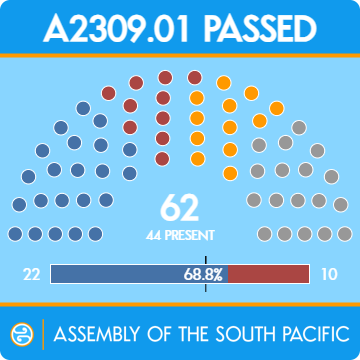An act to establish a commission to and manage legislators status
1. Scope
(1) The Legislator Committee is the commission responsible for granting and revoking legislator status to members.
(2) The Legislator Committee comprises no less than three and no more than five legislators that have each been appointed by the Prime Minister and approved by the Assembly via a simple majority vote.
(3) A member of the Legislator Committee is removed from the committee if
a. the member resigns,
b. the member loses legislator eligibility, or
c. the member is recalled by the Assembly through regular order.
(4) If there is no member of the Legislator Committee available due to vacancy or leave, and there are outstanding duties to be performed, the Prime Minister may appoint an emergency member to handle any urgent matters of the committee. The Council on Regional Security may, on security grounds only, rescind the Prime Minister’s appointment. The emergency member’s tenure will last until the Prime Minister rescinds the appointment or until one week after a regular committee member is available, whichever happens sooner.
2 1 . Legislator Applications
(1) Any member citizen of the Coalition is eligible to attain legislator status if the Chair of the Assembly does not opine that they are seeking legislator status in bad faith.
a. the Legislator Committee does not opine that they are seeking membership in bad faith,
b. they have a nation in the South Pacific,
c. are not attempting to join with multiple nations or identities, and
d. are not considered by the Council on Regional Security to be a significant risk to regional security.
(2) A member of the Coalition may attain legislator status through an application with the Legislator Committee. The Committee shall confirm the reception of an application within 48 hours. The Committee will determine the eligibility of the applicant, consulting any other institutions of the Coalition as needed to inform its decision, and shall strive to accept or deny each applicant within a week.
(32) An application for legislator status must include at least:
a. the current nation in the South Pacific;
b. any colloquial aliases of the individual in use within the last year, or in prominent use longer than a year ago;
c. the current World Assembly nation of the individual (in case of a floating World Assembly membership, the applicant may list multiple nations such that World Assembly membership can be traced throughout the application process); and
d. a pledge to uphold the laws of the Coalition of the South Pacific.
a. A link to their accepted citizenship application, and
b. Any relevant updates to the citizenship application that changed since the application was made.
(4) The Legislator Committee may request additional legitimation steps from applicants, such as requesting a telegram from a World Assembly nation. An applicant may choose to publicly withhold some information and only disclose it to the Council on Regional Security in case of reasonable concerns of confidentiality.
(53) Upon acceptance or denial of an application, the Legislator Committee Chair of the Assembly shall post the result (including a sufficient reason in case of a denial) both in response to the application as well as per telegram to the applicant nation.
a. The applicant may appeal a rejection to the Assembly at large for a vote.
3 2. Legislator Checks
(1) Continued legislator status requires active membership and good behaviour.
(2) Within the first week of each calendar month, the Legislator Committee Chair of the Assembly will remove legislator status from a legislator if they failed the voting requirement in the past month, if applicable, or otherwise no longer meet the eligibility requirements as described herein. If a legislator no longer meets the eligibility requirements (not including the voting requirement), and it would be impossible for them to meet the requirements before the first week of the following calendar month, the Legislator Committee Chair of the Assembly may remove their legislator status at their discretion before the appointed week. The Legislator Committee Chair of the Assembly may exercise discretion and not remove legislators under reasonable extenuating circumstances.
(3) A legislator fails the voting requirement if they are absent for more than half of all votes finished in the previous calendar month, if a minimum of two votes occurred.:
a. The Assembly finished at least three votes in the previous calendar month and the legislator was absent for more than one-third of those votes; or
b. The Assembly finished exactly two votes in the previous calendar month and the legislator was absent for both of those votes.
(4) Legislators may request a leave of absence for a non-indefinite period of time, specifying the end date of such leave, which will be subject to discretionary approval from the Chair of the Assembly or their deputies. During such time, legislators on a leave of absence are exempt from the voting requirement.
(5) The Chair of the Assembly may order the Legislator Committee to suspend legislator privileges for disruptive members. Frequent suspensions may be grounds for ineligibility, if found appropriate in a fair trial by the High Court.
4. Constitutional Law
(1) The Legislator Committee Act is a constitutional law, and further amendments to it must meet constitutional amendment requirements.
